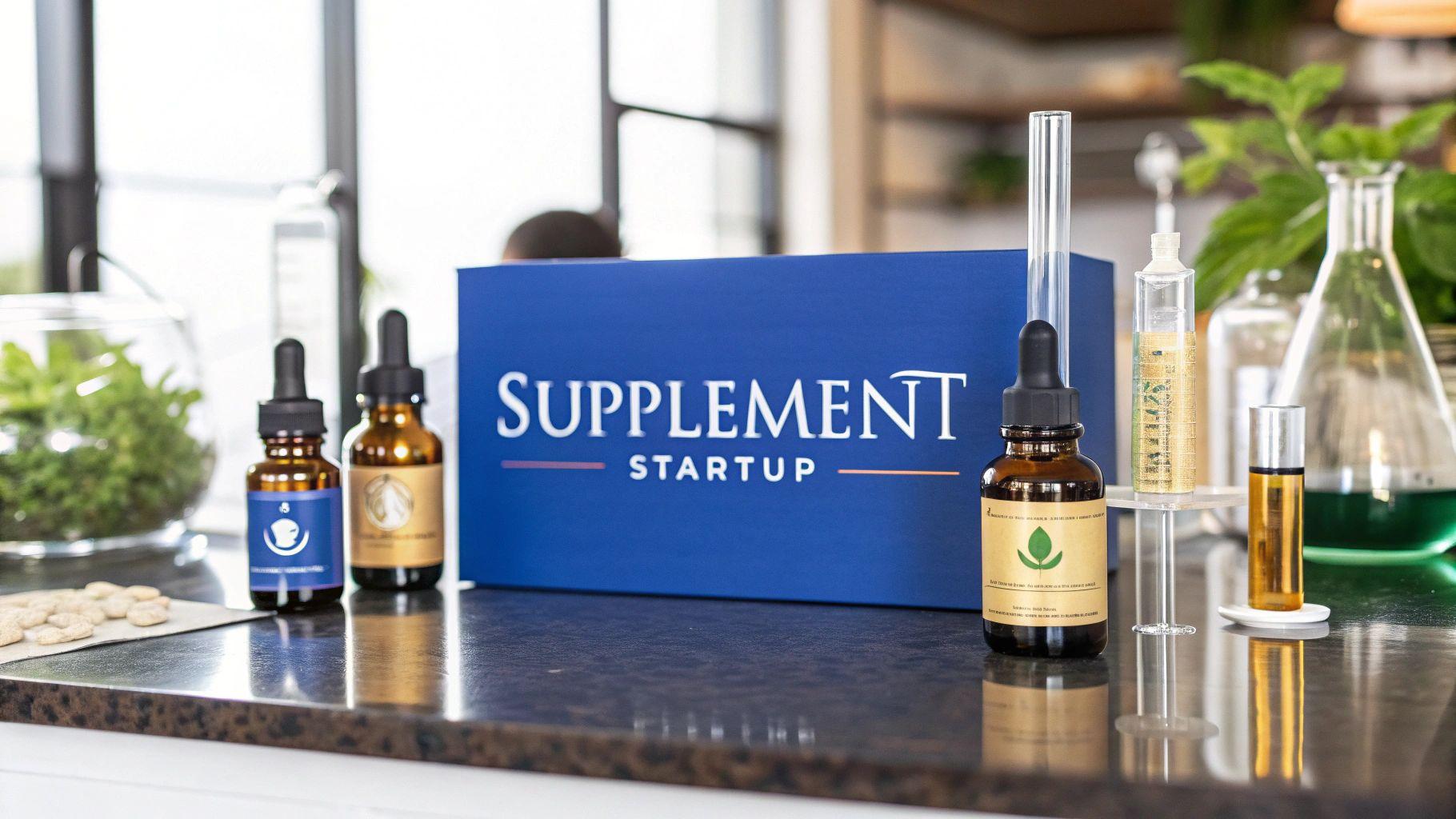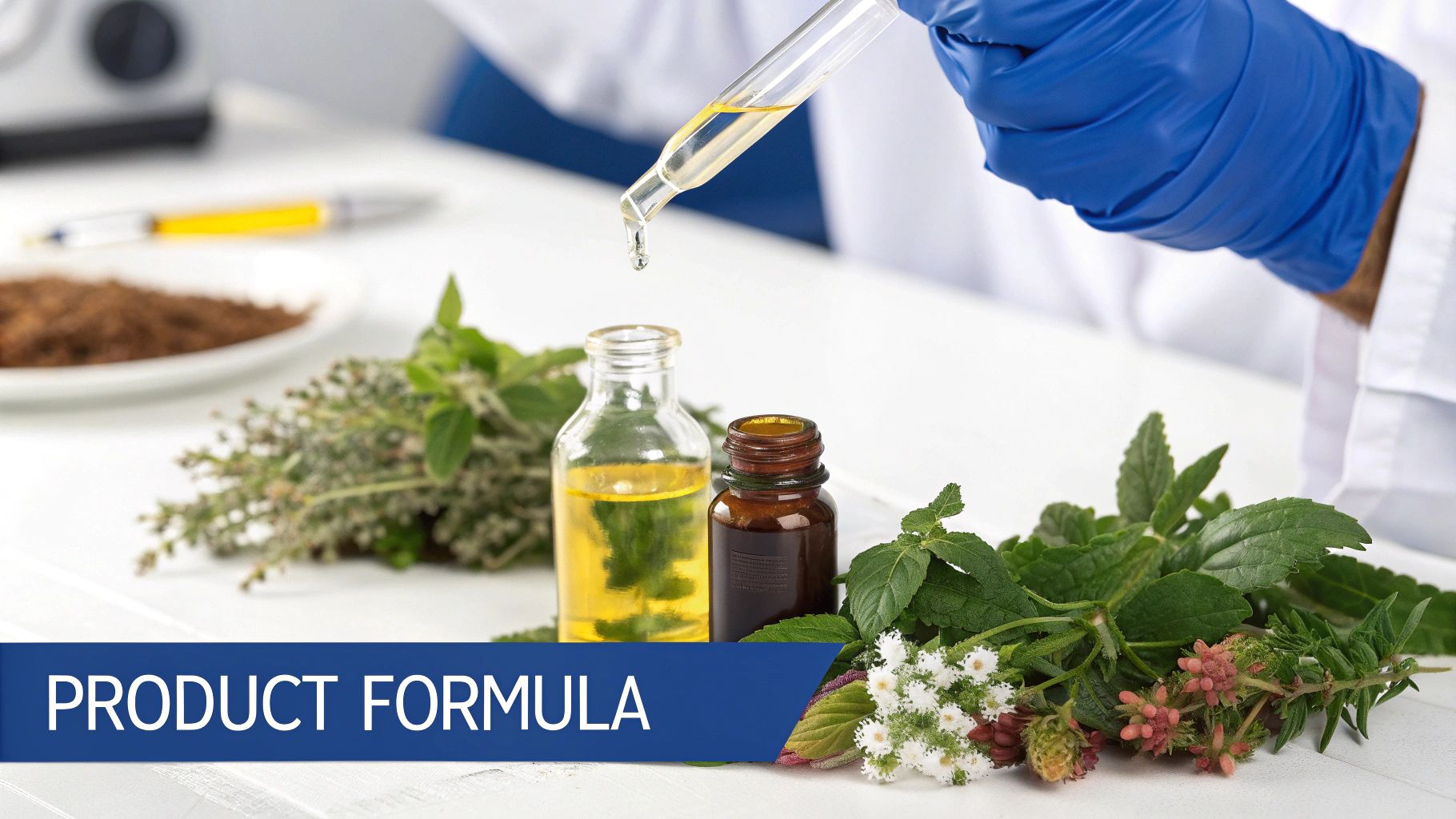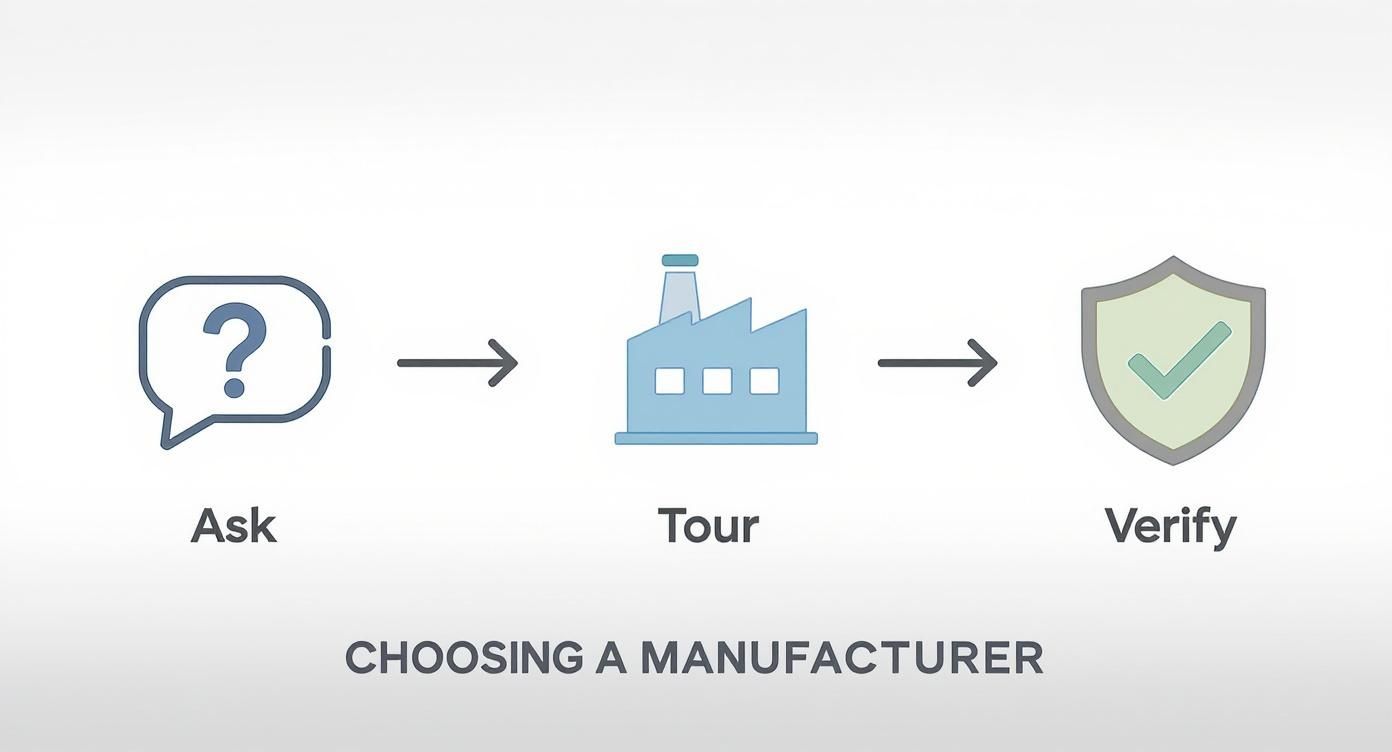How to Start a Supplement Company: A Step-by-Step Guide for Entrepreneurs
how to start supplement company: A practical founder's guide to market research, formulation, manufacturing, and launching your brand.
 Get a Free Quote Today!
Get a Free Quote Today!You're exploring how to start a supplement company. Excellent. You've identified a massive market, but success requires more than just a good idea. Building a lasting brand in the liquid supplement space hinges on a strategic plan—one that covers your niche, your legal obligations, and your path to market.
This guide is for entrepreneurs, brand managers, and e-commerce founders who want to launch a private-label liquid supplement brand. We’ll walk you through the process, from concept to customer, positioning you for success from day one.
Laying the Groundwork for a Killer Supplement Brand

Before you dive into formulas and packaging, you need a strategic foundation. A powerful brand isn't just about a slick logo; it’s about owning a specific corner of a crowded market. It’s time to move past the passion project and get serious about your business plan.
The supplement industry is exploding. The global market, valued at over USD 473.4 billion in 2025, is projected to reach USD 888.64 billion by 2035. This growth presents a huge opportunity, but it also signals the need for a sharp, focused strategy to stand out.
Find Your Niche (Seriously, Don't Skip This)
Your first critical decision is identifying a specific audience you can serve better than anyone else. Broad categories like "immune support" or "energy boosters" are a recipe for getting lost in the noise. You must drill down.
Consider these more focused examples:
- Liquid herbal tinctures for stressed-out millennials who value holistic wellness.
- Post-workout recovery drops specifically for female endurance athletes.
- Cognitive support formulas for professionals over 40 juggling demanding careers.
The goal is to find an underserved audience whose problems you can solve. Analyze what the big players are doing, but pay closer attention to what they’re not doing. Are their flavors outdated? Is their branding stale? Are customer reviews highlighting gaps you can fill? That’s where you’ll win.
A winning brand doesn't try to be everything to everyone. It aims to be everything to someone. Your niche is your superpower—it focuses your message, your formula, and your marketing for maximum impact.
Nail Down Your Brand Promise
Once you know who you're serving, you must define how you'll help them. This is your brand promise—the unique value that compels a customer to choose your product. This is the soul of your company.
Your brand promise should answer a few core questions:
- What problem are we solving? (e.g., "We take the guesswork out of herbal remedies.")
- What do we stand for? (e.g., "Purity, transparency, and science-backed ingredients.")
- What’s our vibe? (e.g., "Authoritative and trustworthy, yet approachable.")
Building a brand people recognize and trust is critical. For more guidance on defining your company's identity, explore these excellent small business branding tips. They can help you create an experience that resonates with your customers.
Get Real About Your Startup Budget
One of the fastest ways to fail is to mismanage your capital. You must be brutally honest about the costs from day one. Your budget needs to cover the entire journey, from concept to a paying customer.
Here's a realistic look at where your cash will go. This isn't just a list; it's a financial roadmap for your launch.
Initial Startup Budget Considerations
A clear budget prevents surprises and keeps your launch on track. Here’s a sample breakdown of the major expenses you should anticipate for a pilot run.
| Expense Category | Estimated Cost Range (Pilot Run) | Key Considerations |
|---|---|---|
| Formulation & R&D | $0 – $10,000+ | Private label is often free to start. A fully custom formula is a serious investment. |
| Initial Inventory (MOQ) | $5,000 – $25,000 | Your manufacturer's Minimum Order Quantity (MOQ) and formula cost are the biggest factors here. |
| Packaging & Labeling | $2,000 – $7,000 | This covers sourcing bottles, label design, and the actual print run. Premium packaging costs more. |
| Third-Party Testing | $500 – $2,500 | Non-negotiable for verifying product potency and purity. Do not skip this. |
| Legal & Trademarks | $1,500 – $5,000 | Includes business entity formation, trademark registration, and legal review of your claims. |
| Website & E-commerce | $1,000 – $8,000 | Covers your Shopify or WooCommerce setup, theme, necessary apps, and initial site content. |
| Launch Marketing | $3,000 – $15,000 | Set aside a real budget for social media ads, influencer outreach, and creating launch content. |
Getting this roadmap right—your niche, brand, and budget—provides a stable foundation. It's the essential work that prepares you to navigate the complexities of launching a supplement company.
Creating a Product That Customers Love
Your formula is the core of your brand promise. A great marketing message may drive the first sale, but an effective, high-quality product earns loyalty and repeat business. This is where your vision becomes a tangible reality.

The first step in product development is choosing your formulation path. For new brands, there are two primary options, each with distinct advantages and trade-offs.
The Two Paths to a Market-Ready Formula
Your choice here directly impacts your budget, launch timeline, and level of creative control. Let’s explore the two main models for bringing a product to market.
1. Private Label (White Label) Formulas Consider this the fast track. A private-label product uses a pre-existing formula that your manufacturing partner has already developed and market-tested. You essentially apply your brand and label to a proven product.
This approach is the quickest and most cost-effective way to launch. It eliminates upfront R&D costs and can shorten your time to market from months to weeks. It’s an ideal way to validate your brand concept and generate revenue without the high risk and investment of a full custom formulation.
2. Custom Formulas If your brand is built on a truly novel product idea, a custom formula is the right path. This involves working directly with formulators to build a proprietary blend from the ground up.
While this option provides complete ownership and a unique market position, it demands a significantly larger investment of time and capital. Development, extensive stability testing, and pilot runs add cost and complexity to the process. You can learn more about this process in our guide on how to create a supplement formula.
A Partnership Mindset: A great manufacturer isn't just a supplier; they're your R&D partner. Whether you choose a private-label base or a full custom build, they should collaborate with you to ensure the final product perfectly aligns with your brand’s vision and your customers' needs.
Selecting Ingredients That Drive Results
Regardless of your formulation path, ingredient selection is paramount. It’s not just about efficacy; it’s about what your target audience is actively seeking. Aligning with current consumer demand is a smart strategy for any new supplement company.
For instance, the global vitamin and mineral supplement market was valued at USD 61.8 billion in 2025 and is projected to reach USD 104.5 billion by 2035. This growth is driven by strong consumer interest in immune support, healthy aging, and preventive health, with a clear preference for organic and plant-based ingredients. Understanding these trends helps you select ingredients that are not only scientifically sound but also possess built-in market demand.
Your manufacturing partner can be a valuable resource here. A good partner will recommend botanicals and nutraceuticals backed by solid research and, crucially, a reliable supply chain.
The Critical Role of Flavor and Stability
With liquid supplements, the formula extends beyond the active ingredients. The taste, texture, and shelf life are critical to the customer experience. This is especially true for herbal extracts, which can often be bitter.
A skilled formulator is a game-changer. They use natural sweeteners, flavors, and stabilizers to craft a product that is not just tolerable but enjoyable. This involves several key steps:
- Flavor Masking: Utilizing natural ingredients like stevia, monk fruit, or glycerin to balance the harshness of certain botanicals.
- Mouthfeel and Texture: Adding agents like acacia gum to create a smooth, pleasant consistency.
- Stability and Preservation: Ensuring the formula remains potent and safe throughout its shelf life. This often involves forward-thinking techniques like cold-fill technology to protect delicate ingredients without harsh preservatives.
The objective is to create a sensory experience that encourages daily use. A product that tastes great is one customers will stick with, turning a first-time buyer into a loyal brand advocate.
Navigating Manufacturing and FDA Compliance
This is where your brand’s integrity is forged. A brilliant formula and a killer marketing plan mean nothing if your product isn't safe, compliant, and consistently high-quality. This phase is about building a foundation of trust with your customers—it is non-negotiable.
When vetting partners to launch your supplement company, you’ll encounter a host of industry acronyms. These are your checklist for quality and safety.

Understanding the Pillars of Quality
Choosing the right manufacturing partner is about their absolute commitment to an airtight quality system. These credentials separate the professionals from the pretenders.
-
cGMP (Current Good Manufacturing Practices): This is the gold standard. A cGMP-certified facility adheres to the FDA's most rigorous guidelines for every step, from raw material sourcing to final bottling. It guarantees consistency and safety in every batch.
-
FDA-Registered Facility: This is the baseline requirement. It means the facility is known to the FDA and subject to inspection. If a potential partner isn't registered, walk away.
-
UL Certified: A UL certification provides another layer of credibility. It means an independent third party has audited the facility's processes and verified its cGMP compliance. It's objective proof of their commitment to quality.
A manufacturer that proudly holds these certifications is demonstrating a deep, operational commitment to quality. This protects your customers and, just as importantly, protects your brand from significant legal and financial risk.
Why Third-Party Testing Is Your Best Insurance Policy
Your product is manufactured. How do you prove that what’s on the label is what’s in the bottle?
The answer is third-party testing. This involves sending a sample from your finished batch to an independent lab to verify its purity, potency, and safety. This step is crucial.
It confirms your product is free from contaminants like heavy metals or microbes. It also verifies that active ingredient levels precisely match your Supplement Facts panel. This is your ultimate proof of quality and your best defense against regulatory scrutiny.
A Certificate of Analysis (CoA) from a third-party lab is your golden ticket. It's undeniable proof that you've done your due diligence, building a level of transparency that savvy customers now demand.
The demand for this level of verification is rising. The dietary supplements testing market was valued at USD 2.4 billion in 2025 and is projected to hit USD 3.65 billion by 2030. This trend indicates that both regulators and consumers are insisting on higher standards, making robust testing a non-negotiable aspect of your business. For more on this, you can find detailed insights into the dietary supplements industry here.
Decoding FDA Labeling and Claims
Your product label is a legal document. The FDA has specific, strict rules about what you can and cannot say. Errors can lead to warning letters or even product seizure.
The Supplement Facts Panel This is the standardized box on your label listing all ingredients, serving sizes, and amounts per serving. It must be perfectly formatted and accurately reflect your third-party test results. Any reputable manufacturing partner will provide a compliant panel.
Making Compliant Claims This is the single biggest trap for new brands. The cardinal rule is you cannot claim your supplement will diagnose, treat, cure, or prevent any disease. Those are drug claims and are strictly forbidden for supplements.
Instead, you can make "structure/function" claims. These statements describe the role of a nutrient in supporting the body's normal structures or functions.
Let’s be practical:
- Forbidden Drug Claim: "Cures insomnia."
- Acceptable Structure/Function Claim: "Supports restful sleep."
The distinction is subtle but critical.
Every structure/function claim must be accompanied by this exact FDA disclaimer: "These statements have not been evaluated by the Food and Drug Administration. This product is not intended to diagnose, treat, cure, or prevent any disease."
Navigating these regulations can be complex, which is why having an expert partner is so valuable. For a deeper look, review our guide on FDA regulations for dietary supplements.
Finding the Right Manufacturing Partner
Your manufacturer is more than a vendor—they are a core part of your team. The right partner is an extension of your brand, acting as your R&D expert, compliance guide, and operational backbone.
Choosing the wrong one can lead to production delays, quality control issues, and serious legal trouble. This is one of the most important decisions you'll make when starting your supplement company. A true partnership is built on shared values of quality and transparency. You're looking for a team as invested in your product’s success as you are.
Vetting Your Potential Partners
Approach potential manufacturers with a prepared checklist. Your goal is to assess their capabilities, quality systems, and experience, especially with the unique challenges of liquid supplements. Don't be shy about digging deep.
Treat this process like hiring for a key position. A great manufacturer will welcome your questions and be proud to showcase their operations.
Here are the absolute must-ask questions:
- What are your exact certifications? Request proof of their cGMP registration, UL certification, and FDA registration. A legitimate partner will provide this documentation readily.
- What's your specific experience with liquid herbal supplements? Liquids present unique challenges in flavoring, stability, and preservation. Partner with someone who has a proven track record.
- Can you walk me through your quality control process? Ask for details on how they test raw materials, what in-process checks they perform, and how they test the final product.
- What kind of production technologies do you use? Be specific. Ask about innovations like cold-fill technology, which preserves the integrity of sensitive botanicals without harsh preservatives.
Understanding MOQs and Production Flexibility
For any new brand, the Minimum Order Quantity (MOQ) is a major factor. This is the smallest number of units a manufacturer will produce in a single run, and it directly impacts your upfront cash investment. A high MOQ can tie up your capital in inventory before your first sale.
A flexible manufacturing partner understands that new brands need to start smart. They should offer a path from pilot runs to full-scale production.
Look for a partner who offers both small pilot run capabilities and a clear path to full-scale production. This lets you test the market with a smaller, more manageable investment before you go all-in on a huge inventory.
This flexibility signals a manufacturer committed to building long-term relationships. They are willing to grow with you. This approach reduces your initial risk and sets you up for sustainable success. To learn more, read our complete guide on finding a reputable supplement manufacturer.
Looking for a True Partnership Mindset
Ultimately, the best equipment and certifications are meaningless without the right attitude. You want a manufacturer who acts like a partner, not just an order-filler. They should be proactive, transparent, and communicative.
This means you get clear timelines, real-time project updates, and direct access to their team. A great partner offers insights, perhaps helping you refine your formula or select better packaging. This collaborative spirit turns a simple transaction into a powerful partnership that can drive your brand for years.
Planning Your Brand Launch and Growth
With your product manufactured, the real work begins: getting it into customers' hands. A strong go-to-market plan is what separates a brand that takes off from one that fizzles. This phase is about the tactical execution of launching and scaling your new supplement company.
First, get your operational house in order. Every product variation needs a unique Stock Keeping Unit (SKU). A 1oz bottle versus a 2oz bottle, or a peppermint versus a citrus flavor—each is a distinct product requiring its own SKU for inventory tracking. Getting this right prevents fulfillment headaches down the line.
Building Your E-commerce and Fulfillment Engine
With SKUs defined, you must decide how you'll sell and ship your products. For most new supplement brands, this means choosing between a direct-to-consumer (DTC) store or a marketplace like Amazon.
Shopify (DTC) Your own Shopify store gives you complete control over the brand experience, customer data, and profit margins. This is how you build a direct relationship with your audience, which is essential for fostering loyalty and repeat purchases.
Amazon FBA (Fulfillment by Amazon) Amazon provides immediate access to a massive audience of active buyers. Using FBA means Amazon handles storage, packing, and shipping, which removes a significant operational burden. The trade-off is less brand control and substantial fees.
Many successful brands use a hybrid approach: they launch on Shopify to build a community and simultaneously leverage Amazon to capture its vast customer base.
This is where having a true partnership with your manufacturer pays off. A great partner can offer turnkey solutions, including in-house fulfillment for both your DTC orders and FBA prep. This streamlines everything, saving you a ton of time and complexity.
Crafting a High-Impact Launch Strategy
A product launch is a carefully orchestrated campaign designed to build momentum before your product is available. A well-executed launch can set the trajectory for your brand's future.
Here are proven tactics to build initial hype:
- Build Pre-Launch Buzz: Tease your product on social media weeks in advance. Share behind-the-scenes content, discuss the problem your product solves, and build an email list of eager customers.
- Seed with Influencers: Partner with a small group of micro-influencers who align with your brand’s mission. Send them the product early and let them share their authentic experience with their followers.
- Run Targeted Ads: Use platforms like Meta (Facebook and Instagram) to run laser-focused ad campaigns aimed at your ideal customer. Initially, direct your budget toward a single goal: driving traffic to your pre-launch email signup page.
This infographic outlines a simple framework for vetting partners who can support your launch and growth.

This process—asking the right questions, touring the facility, and verifying everything—ensures you find a partner with the robust capabilities and quality systems needed to help you scale reliably.
Scaling Smart with Customer Retention
The first sale is exciting, but sustainable growth comes from turning one-time buyers into loyal fans. Smart scaling focuses on maximizing the value of your existing customers.
A subscription model is a powerful tool for this. Offering a small discount for monthly deliveries creates predictable, recurring revenue and integrates your product into customers' daily routines. If you offer subscriptions, you must understand the nuances of high-risk payment processing. Learn more about managing high-risk payments for subscription models to ensure stable cash flow.
Beyond subscriptions, focus on community. Engage with customers on social media. Share valuable wellness content, not just sales pitches. Most importantly, listen to their feedback. A brand that makes its customers feel heard is a brand that will continue to grow.
Answering Your Top Questions About Starting a Supplement Brand
Launching a supplement company is a complex undertaking. As an industry insider, I’ve heard the same questions from hundreds of entrepreneurs. Let’s get you clear, straightforward answers so you can move forward with confidence.
How Much Does It Really Cost to Start a Supplement Company?
There's no single number, but a realistic initial investment is between $10,000 and $50,000. Where you fall in that range depends on your early choices.
Your biggest expenses will be:
- Product R&D: This can be zero if you choose a turnkey private-label formula. A fully custom product requires a significant upfront investment.
- Initial Production Run: This is often your largest single cost, dictated by your manufacturer’s Minimum Order Quantity (MOQ).
- Packaging and Label Design: Sourcing quality bottles, professional design, and the first print run add up.
- Third-Party Testing: This is a non-negotiable cost to ensure product safety and label accuracy.
- Legal Fees and Marketing: Budget for trademarking, business formation, and the funds to launch your product effectively.
To minimize startup costs, start with a private-label product and a smaller initial run. This approach gets you to market faster and with less financial risk.
What Are the Biggest Legal Mistakes to Avoid?
The most common and costly mistake is making unapproved health claims. The FDA has strict rules governing what you can say.
Claiming your supplement can "treat, cure, or prevent" any disease is a direct violation that can result in warning letters or worse, sinking your brand before it starts.
Other major pitfalls include:
- An incorrectly formatted Supplement Facts panel.
- Failing to use an FDA-registered, cGMP-compliant facility.
- Lacking scientific substantiation for the structure/function claims you make.
Always consult with a regulatory expert or lean on your manufacturing partner's compliance team before your label goes to print. Getting this wrong is a brand killer.
How Long Does It Take from Idea to a Sellable Product?
A realistic timeline, from concept to a product ready to ship, is typically 6 to 12 months.
Here’s a rough breakdown:
- Market Research & Brand Strategy: 1-2 months
- Formulation & R&D (for a custom product): 2-4 months
- Sourcing Packaging & Materials: 1-2 months
- Manufacturing & Production: 6-10 weeks
- Final Lab Testing & Quality Control: 1-2 weeks
Delays in one stage can create a domino effect. This is why a reliable, transparent manufacturing partner who provides a clear production schedule is absolutely essential. Our rapid turnaround times are a key part of our commitment to your success.
Do I Need a Unique Formula to Be Successful?
Absolutely not. This is one of the biggest myths in the industry.
While a unique formula can be a powerful differentiator later on, it is not a prerequisite for a successful launch. Many of today’s leading brands started with proven private-label formulas.
Their success was built on exceptional branding, smart marketing, and creating a strong community. The private-label path allows you to enter the market faster and with significantly less financial risk. You can validate your brand concept and start generating revenue before committing to a costly and time-consuming custom development project.
Ready to turn your vision into a market-ready liquid supplement? At Triton Nutra Group, we are your R&D partner from concept through launch. We offer flexible MOQs, rapid turnaround times, and unmatched compliance expertise in our UL-certified, FDA-registered facility. Let's build your brand together. Request a free consultation and quote today.